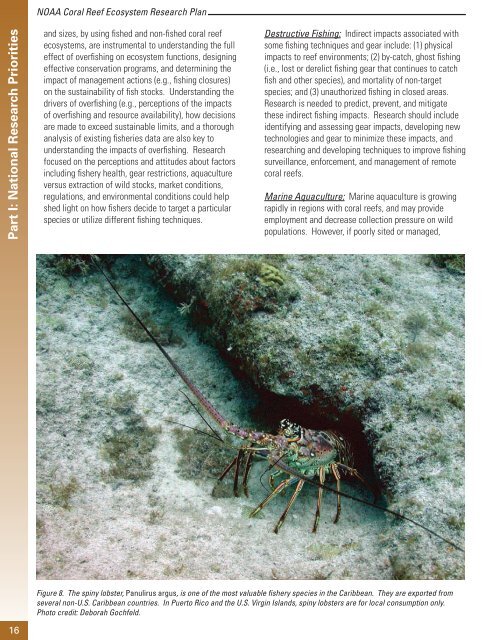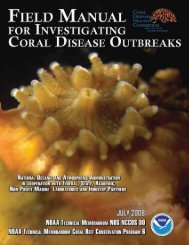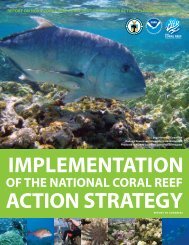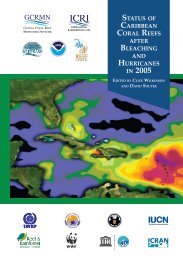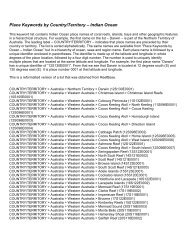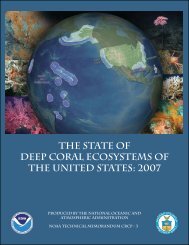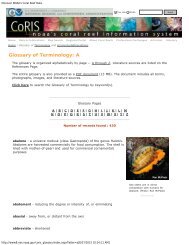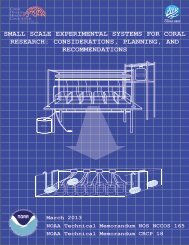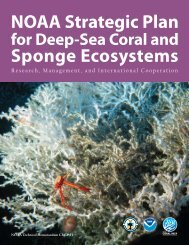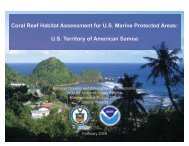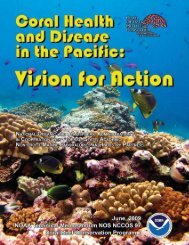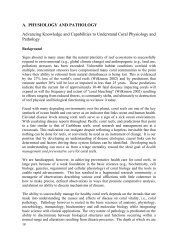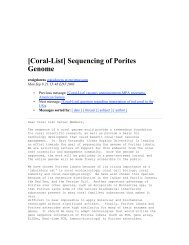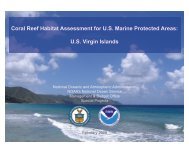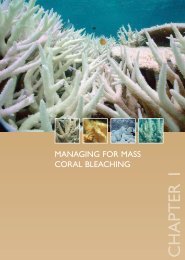noaa coral reef ecosystem research plan - Mississippi-Alabama Sea ...
noaa coral reef ecosystem research plan - Mississippi-Alabama Sea ...
noaa coral reef ecosystem research plan - Mississippi-Alabama Sea ...
Create successful ePaper yourself
Turn your PDF publications into a flip-book with our unique Google optimized e-Paper software.
NOAA Coral Reef Ecosystem Research Plan<br />
Part I: National Research Priorities<br />
and sizes, by using fished and non-fished <strong>coral</strong> <strong>reef</strong><br />
<strong>ecosystem</strong>s, are instrumental to understanding the full<br />
effect of overfishing on <strong>ecosystem</strong> functions, designing<br />
effective conservation programs, and determining the<br />
impact of management actions (e.g., fishing closures)<br />
on the sustainability of fish stocks. Understanding the<br />
drivers of overfishing (e.g., perceptions of the impacts<br />
of overfishing and resource availability), how decisions<br />
are made to exceed sustainable limits, and a thorough<br />
analysis of existing fisheries data are also key to<br />
understanding the impacts of overfishing. Research<br />
focused on the perceptions and attitudes about factors<br />
including fishery health, gear restrictions, aquaculture<br />
versus extraction of wild stocks, market conditions,<br />
regulations, and environmental conditions could help<br />
shed light on how fishers decide to target a particular<br />
species or utilize different fishing techniques.<br />
Destructive Fishing: Indirect impacts associated with<br />
some fishing techniques and gear include: (1) physical<br />
impacts to <strong>reef</strong> environments; (2) by-catch, ghost fishing<br />
(i.e., lost or derelict fishing gear that continues to catch<br />
fish and other species), and mortality of non-target<br />
species; and (3) unauthorized fishing in closed areas.<br />
Research is needed to predict, prevent, and mitigate<br />
these indirect fishing impacts. Research should include<br />
identifying and assessing gear impacts, developing new<br />
technologies and gear to minimize these impacts, and<br />
<strong>research</strong>ing and developing techniques to improve fishing<br />
surveillance, enforcement, and management of remote<br />
<strong>coral</strong> <strong>reef</strong>s.<br />
Marine Aquaculture: Marine aquaculture is growing<br />
rapidly in regions with <strong>coral</strong> <strong>reef</strong>s, and may provide<br />
employment and decrease collection pressure on wild<br />
populations. However, if poorly sited or managed,<br />
Figure 8. The spiny lobster, Panulirus argus, is one of the most valuable fishery species in the Caribbean. They are exported from<br />
several non-U.S. Caribbean countries. In Puerto Rico and the U.S. Virgin Islands, spiny lobsters are for local consumption only.<br />
Photo credit: Deborah Gochfeld.<br />
16


